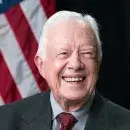
James Earl Carter
Jimmy Carter (James Earl Carter, Jr.), thirty-ninth president of the United States, was born Oct. 1, 1924, in the small farming town of Plains, Georgia, and grew up in the nearby community of Archery. His father, James Earl Carter, Sr., was a farmer and businessman; his mother, Lillian Gordy Carter, a registered nurse.
He was educated in the public school of Plains, attended Georgia Southwestern College and the Georgia Institute of Technology, and received a B.S. degree from the United States Naval Academy in 1946. In the Navy he became a submariner, serving in both the Atlantic and Pacific fleets and rising to the rank of lieutenant. He subsequently undertook graduate work at Union College in reactor technology and nuclear physics and served as senior officer of the pre-commissioning crew of the Seawolf, the second nuclear submarine.
When his father died in 1953, he resigned his naval commission and returned with his family to Georgia. He took over the Carter farms, and he and Rosalynn (married in 1946) operated Carter's Warehouse, a general-purpose seed and farm supply company in Plains. He quickly became a leader of the community, serving on county boards supervising education, the hospital authority, and the library. In 1962 he won election to the Georgia Senate. He lost his first gubernatorial campaign in 1966, but won the next election, becoming Georgia's 76th governor on January 12, 1971. He was the Democratic National Committee campaign chairman for the 1974 congressional and gubernatorial elections.
He won his party's nomination on the first ballot at the 1976 Democratic National Convention and was elected president on Nov. 2, 1976. He served as president from Jan. 20, 1977 to Jan. 20, 1981. Significant foreign policy accomplishments of his administration included the Panama Canal treaties, the Camp David Accords, the treaty of peace between Egypt and Israel, the SALT II treaty with the Soviet Union, and the establishment of U.S. diplomatic relations with the People's Republic of China. He championed human rights throughout the world. On the domestic side, the administration's achievements included a comprehensive energy program conducted by a new Department of Energy; deregulation in energy, transportation, communications, and finance; major educational programs under a new Department of Education; and major environmental protection legislation, including the Alaska National Interest Lands Conservation Act, which doubled the size of the national park system and tripled the wilderness areas.
In addition, Carter wrote thirty-two books, including Why Not the Best? (1975, 1996), A Government as Good as Its People (1977, 1996), Keeping Faith: Memoirs of a President (1982, 1995), Negotiation: The Alternative to Hostility (1984, 2003), The Blood of Abraham: Insights into the Middle East (1985, 1993, 2007), and Everything to Gain: Making the Most of the Rest of Your Life, written with Rosalynn Carter (1987, 1995).
In 1982, he became University Distinguished Professor at Emory University in Atlanta, Georgia, and with Rosalynn Carter founded The Carter Center. The nonpartisan and nonprofit Center addresses national and international issues of public policy. Carter Center staff and associates have joined with President Carter in efforts to resolve conflict, promote democracy, protect human rights, and prevent disease and other afflictions. The Center has spearheaded the international effort to eradicate Guinea worm disease, which is poised to be the second human disease in history to be eradicated.
President Carter and The Carter Center have engaged in conflict mediation in Ethiopia and Eritrea (1989), North Korea (1994), Liberia (1994), Haiti (1994), Bosnia (1994), Sudan (1995), the Great Lakes region of Africa (1995-96), Sudan and Uganda (1999), Venezuela (2002-2003), Nepal (2004-2008), Ecuador and Colombia (2008), the Middle East (2003-present), and Mali (2018-present). Under his leadership The Carter Center has sent 114 election-observation missions to the Americas, Africa, and Asia. These include Panama (1989), Nicaragua (1990), China (1997), Nigeria (1998), Indonesia (1999), East Timor (1999), Mexico (2000), Guatemala (2003), Venezuela (2004), Ethiopia (2005), the Democratic Republic of the Congo (2006), Nepal (2008), Lebanon (2009), Sudan (2010), Tunisia (2011), Egypt (2011-2012), Kenya (2013), Mozambique (2014), Myanmar (2016), Liberia (2017), and Guyana (2020).
He was awarded the Nobel Peace Prize for 2002 “for his decades of untiring effort to find peaceful solutions to international conflicts, to advance democracy and human rights, and to promote economic and social development.”